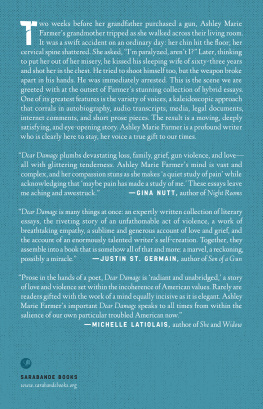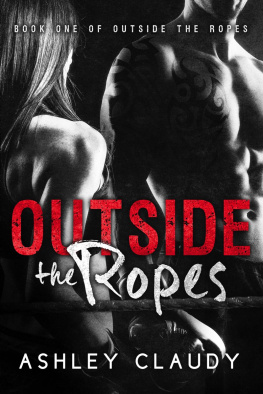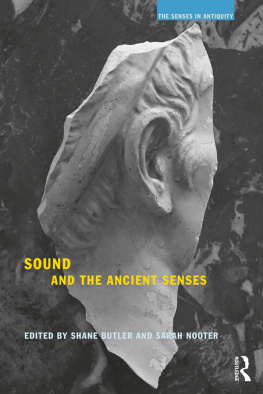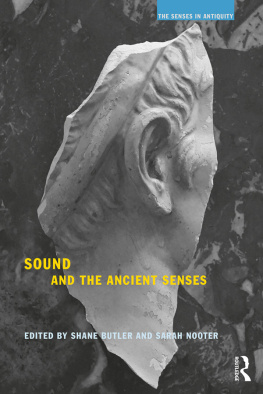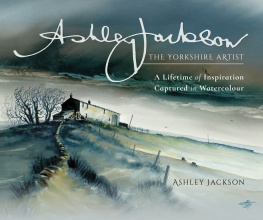July 1999
Ive been watching the sky since 3:00 a.m., trying to pinpoint the moment when night turns into day. A lazy yellow strip of light wavers across the horizon, over downtown Richmond, VA, over Church Hill, past the train tracks, factories, and the James River. The yellow fades into a light pink, which then dissipates into purple, and finally an indiscriminate gray. I imagine industrial air clogging the machinations of early risers, wriggling into the corners of living rooms and over the lids of coffee pots, moving into yawning mouths not yet filled with words. A few stars remain, caught in atmospheric netting. The Annabel Lee idles at dock.
Do you know why factories on the East Coast are built on the east side of cities? my father asks me one day, driving back from a soccer game in Occoquan. He says the trade winds blow east, scooting noxious emissions over lines of houses east of downtown.
Standing between this forgotten colony and the window of this room in the Medical College of Virginia, the crown of Church Hill breaks the smog. On its slope, a playground with bright red and green aluminum slides and see saws remains deserted. At its base, trains slow, sigh, and heave along, past children chucking gravel at their wheels, placing nickels and pennies on the rails to be stretched into ovals. With closed eyes, they lean in along the rails. Tobacco row is quiet.
My fathers house lies on the south side of Church Hill, next to a statue of a nameless Confederate soldier. I see my father, superimposed on a blue sky, in a vacant smile and full chest of air. In the spring, he says, everyone comes together to roast pork and dance at the High on the Hog festival. When he says this, I picture a red, cracked-skin pig turning over a black, crusted skewer, which runs between its thighs and out his mouth.
From the window of the hospital where my mother lies, I can see the bald spot on the southeast side of the hill where my father lives. It is the forty-acre emptiness devoted to the memory of a hospital called Chimborazo, which operated during the Civil War. During the War, it was referred to as the hospital on the hill. The hill was chosen because it afforded good drainage. The name Chimborazo was inspired by a volcano of the same name, located in Ecuador. Although Everest is the largest elevation above sea level, due to the bulge of the Earth at the equator, the summit of Ecuadors Chimborazo is the farthest point from the center of the Earth. The distinction lies in point of reference.
Robert E. Lee, the Confederate General who surrendered at Appomattox while Richmond officials lay torch to the city granaries before themselves fleeing, was the first to find a figure in stone on Monument Avenue. His statue faces south, a sign of his safe return home. My grandparents found so much favor in his reputation that they named their son, my father, Robert Lee. They called him Bobby Lee. Its not a name I associate with my father. Years later, as he became careless in desire, I began to uncover the other names by which he went.
A few years after Lees surrender at Appomattox, cardiologist J. M. Da Costa noticed the persistence of certain heart dynamics in Civil War veterans. There were alterations in the cardiovascular system, in blood pressure and pulse rate; there was a sustained exhaustion. They were jumpy, startled easily, were occasionally paranoid, and often saw things that were not there. They were indifferent to their surroundings, often confused past and present. Da Costa likened it to a sort of departure from reality, called it Soldiers Heart. During the war, at Chimborazo, they used another term: nostalgia. Identified as a medical syndrome in 1688 by Swiss doctor Johannes Hofer, nostalgia was defined as the sad mood which derived from the patients desire to return to a home that no longer exists. It was considered a curable disease.
I turn from the hospital window and look down at my mothers body. She is so small she blends in with the whiteness of the sheets. But the pattern on her nightgown gives her up: a colony of blue dots, row upon row. She would say that her love for my father, falsely received, made a lie of so many years. She would say it was as if I never existed.
Even in her sleep she scowls, letting her cheeks, eyebrows, and twitching lips drop into their familiar creases. An IV clings to the wrinkled skin of one hand, while the other rests along her side. The other end of the IV travels up to a clear plastic bag marked Saline Solution, and hangs from a tall metal rod on wheels so my mother can take it to the bathroom with her, or on walks down the hall. When we walk down the hall she clutches the cool, metal rod for support. She smiles maniacally to quell the pain.
Halfway down the metal rod, a blue box is attached and beeping as a picture of two yellow lines monitors the vitals. Occasionally it beeps loudly and flashes a flat line across the screen.
Her blue dotted nightgown opens at the neck, displaying a catheter held steady by white tape. The catheter is a direct porthole into my mothers jugular vein. Although shed like to hide it, her clothes never fully cooperate. In old pictures of my high school graduation, my mother appears ghastly pale and skeletal for the middle of the summer, and her light green dress belies an altered terrain of flesh.
Before she began keeping track of my fathers departure, my mother helped me build a model of Jamestown. It will be like no other Jamestown in your class! she said, and began lining up breadsticks for barricades. She stayed up the rest of the night to finish the fort. The next day I teetered into class, arms drawn wide by the berth of such fortitude.
My mother points to the white skin under her right forearm, indicating to me: Look, all the veins have dried up. She smiles and sits straight up, grabs my finger and runs it up and down her arm, pushing down so I can feel the hardened strips no longer blue, all the while looking for a shocked response, as if to prove or make physical this impending death. She shows me the rectangle of raw skin on the top of her left thigh, where the doctors peeled off layers to graft the skin still remaining around the hole where her left breast used to be. The rectangle looks like an aerial view of a fallow crop field. The graft did not catch and when my mother lifts her left arm, I can see her insides. She would say, Come, look into me.
I remember her head, half covered in a soft, blue do-rag I helped her pick out from a catalog of wigs and hats. They even had hats with hair built into them. The models in the catalog seemed to stare back with forced affect. My mother ordered seven wigs and three do-rags. Each wig came in its own cardboard box complete with mini-brush and pocket-size mirror.
Ordering clothes is easy compared to wigs. Or maybe we are not used to it. One wig is too orange, one is too small, and most just call attention to their manufacture. I try to convince my mother that bald is beautiful by citing a list of celebrities with recently bared pates. And when that doesnt work, I try to convince her to get a Bob Marley wig. When she still doesnt budge I go into her bathroom, pull on the orange wig and emerge. She stops crying and starts to smile. She would say, Im not ready to die; Im ready.
Before she lost all of her hair, my mother let me dye it red. It came out brown and ugly. She laughed and cried. When clumps of hair started coming out in her brush, she told me to shave it off. That was the summer we went to stay in Savonnieres, a town near Tour, France; this was our last respite before death. She sat at the kitchen table, looking out through the overhanging roses to the garden. I got a white bowl, filled it with water, and dipped a razor in it. Bending her head forward, I considered where to start. The tendons behind her neck were pulled taut. I wondered if the blade would snap them in half, her head falling forward to clock her sternum. After each draw of the razor I dunked it in the bowl and watched the dark hairs spin. Time was in the languid swaying of wheat, the distant babble of the elementary school children, and the calm, reassuring smile of the craggy, white-haired woman who always seemed to be standing in the doorway of her tiny house, her beagle asleep on the windowsill, and her blue print skirt lapping at the snatches of her ankles. This would be a nice place to die.







